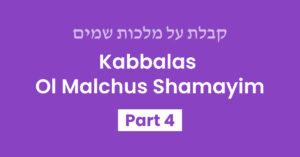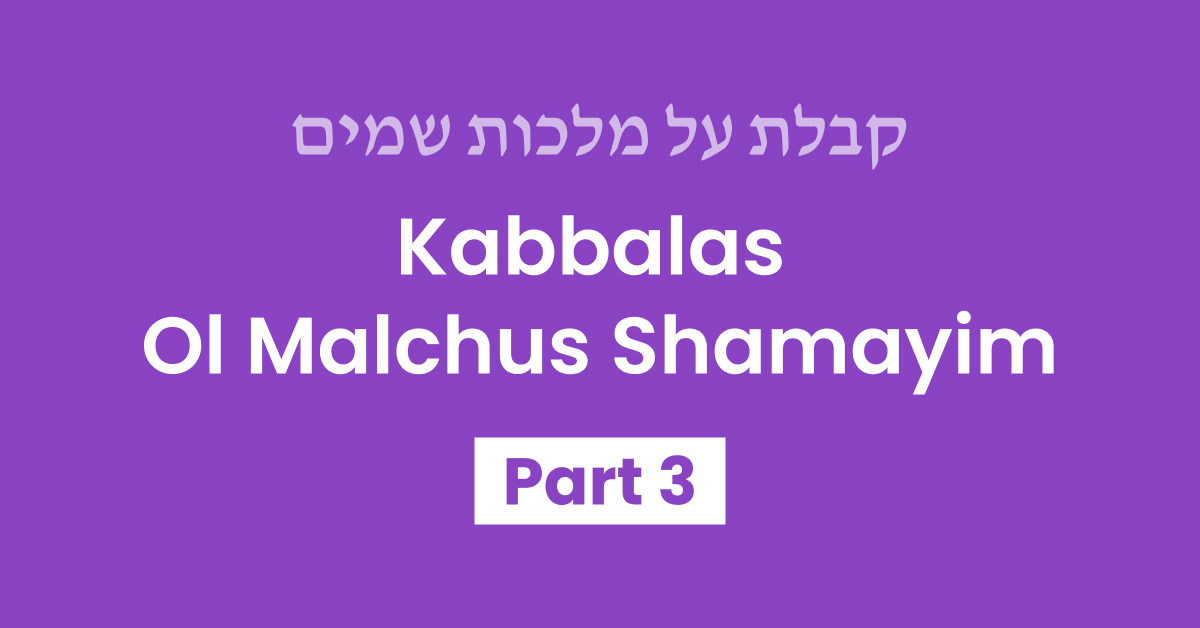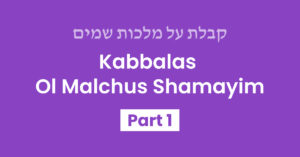Last week, we learned that we are obligated to crown Hashem as our King every year on Rosh Hashana. One way to honor a king is to show that you accept to fulfill his will as your #1 priority, so the way to honor Hashem is to show that we care about doing His mitzvos above all else. Every time we do a mitzvah with this thought in mind, we are fulfilling Kabbalas Ol Malchus Shamayim – recognizing Hashem as our King and accepting to do His will.
We further explained that accepting Hashem as our King is actually the key to earning a favorable judgement on Rosh Hashana. The more we show Hashem that we yearn to do His will, the more He will give us additional tools, strengths, and resources to continue doing mitzvos in the upcoming year. Just as a company chooses to re-hire only its most loyal employees, Hashem will “re-hire” us for next year if we show Him that we are loyal and dedicated to His mission of revealing His Kingship in this world.
A Mysterious Passuk
Imagine that at the birthday party of King Louis, he wants all of his subjects to unanimously declare their loyalty to him. What do you think he’d want them to say? Probably something like “Long live the king!” or “King Louis is our master!”
Is this how Hashem wants us to proclaim our loyalty to Him?
Actually, Hashem asks us to proclaim our loyalty to His kingship in a very different way: by saying the Shema. Chazal1 write that saying Shema is our way of accepting Hashem as King. In fact, every Jewish man is required to say Shema twice a day, in order to be Mekabeil Ol Malchus Shamayim (accept the yoke of the kingship of Heaven) upon himself.
Saying Shema is our way of accepting Hashem as King.
But this concept is very puzzling, because Shema does not mention the word “king” at all!
Shema just says: “Shema Yisroel, Hashem Elokeinu, Hashem Echad – Listen, Yisrael, Hashem is our G-d; Hashem is One.” What does Hashem’s Oneness have to do with His Kingship? How is Shema the quintessential statement of Kabbalas Ol Malchus Shamayim?
What It Means That Hashem Is “One”
On a simple level, “Hashem is One” means that there is only one G-d, and not two. But really, the meaning of “One” is much deeper than that.
The Sifsei Chaim2 explains that recognizing Yichud Hashem (the Oneness of Hashem) means understanding that Hashem is the ONLY true Existence, and we are all dependent on Him. Nothing else exists outside of Hashem.
Hashem is the ONLY true Existence, and we are all dependent on Him.
Although this concept is difficult for our human minds to grasp, we can understand it to a small degree by comparing Hashem to a dreamer and his dream.
Imagine that you are sitting in class and daydreaming about the pizza you plan to eat when you get home. You can picture the warm melted cheese, and can almost smell the aroma coming from the oven… Suddenly, your teacher calls your name and you are interrupted from your daydream. The pizza immediately disappears and you are brought back to reality.
While you were daydreaming, did the pizza really exist? Or was it just a figment of your imagination? Although the pizza may have seemed very real and vivid in your mind, the truth is that the pizza cannot exist on its own. The pizza’s existence was dependent on you. As soon as you stopped thinking about it, the pizza immediately disappeared.
The same concept applies to us and Hashem. The Rambam3 writes that Hashem’s existence is the ONLY true existence, and we are just like transient figments of His imagination. If Hashem would stop thinking about us for even one second, we would immediately cease to exist. In fact, the Nefesh HaChaim4 writes that Hashem has to continuously pump energy into us for us to continue to exist. Our existence is totally dependent on Him.
If Hashem would stop thinking about us for even one second, we would immediately cease to exist.
This is what it means that Hashem is “Emes” (true) – as we say in the tefillos of Rosh Hashana: “M’loch Al Kol Ha’Olam Kulo Bich’vodecha… Ki Ata Elokim Emes U’Devarcha Emes V’Kayum La’ad – May You rule as King over the entire world… because You, Hashem, are Truth…” When we say that Hashem is Emes, we mean that He is the ONLY true existence in the universe.5 Just as the pizza doesn’t really exist – its existence dependents on you – so too, this entire world only exists in a transient state, and our lives are totally dependent on Hashem.
This is what we are supposed to have in mind when we say “Shema Yisrael: Hashem Elokeinu, Hashem Echad.“ – There is only one true existence in the universe – and that is Hashem. (This concept is also known as “Ain Od Milvado – Nothing exists besides for Hashem.”)
This is what we are supposed to have in mind when we say “Shema Yisrael: Hashem Elokeinu, Hashem Echad.“
If Hashem Is “One” – Then I Must Do His Will
Now that we understand a bit about the meaning of Yichud Hashem, we can better understand how saying Shema is an expression of Kabbalas Ol Malchus Shamayim.
Last week, we said that Kabbalas Ol Malchus Shamayim means accepting Hashem’s will as your #1 priority. Just as a king’s commands override everyone else’s wishes, crowning Hashem as King means that we see His will as more important than anyone else’s will. This perspective implies that we are are always considering many different factors: What do I personally want to do? What does my boss want me to do? What does my cousin want me to do? What does my neighbor want me to do? Accepting Hashem as my King means that after considering all factors, I make the decision that Hashem’s wishes come first, above all else.
But when we understand the message of Shema – that Hashem is the ONLY one, true Existence, and nothing else exists besides for Him – then all of our hesitations fade away and our decisions become so much clearer.
But when we understand the message of Shema – that Hashem is the ONLY one, true Existence, and nothing else exists besides for Him – then all of our hesitations fade away and our decisions become so much clearer.
Imagine a father who is putting on a puppet show to entertain his son, Avi. Before he starts the show, Avi’s father says: “Get ready for a great show, Avi! I have some funny puppets here and there’s going to be a surprising end to the story. Please stay seated while I put on the show, and don’t listen to anything the puppets tell you to do.”
Avi’s father starts putting on the show, and in the middle of the show, one of the puppets starts to talk to Avi: “Hey!! Avi!!” calls the puppet. “Why are you always such a good kid? It’s time to show your father who’s boss. See that ball in the corner of the room? I want you to pick it up and throw the ball at your father’s face.”
When Avi hears this, does he have to pause and decide: “Hm… My father wouldn’t want me to throw the ball at his face, but on the other hand, this puppet wants me to do it… Hm… Should I throw the ball, or not?” Of course not! It’s obvious to Avi that the puppet has zero power of its own. When the puppet speaks, it’s really just Avi’s fathers voice being transmitted through the puppet. It would be ridiculous for Avi to throw the ball at his father, since His father is real, and the puppet is not.
This is the type of understanding we are supposed to have when we say “Hashem is One.” Just as the puppet has no power of its own, so too, nothing else in this world has real substance other than Hashem. No person or thing has any power to affect us unless Hashem gives it the power to do so. So it doesn’t matter what your boss thinks, what your cousin wants, or what your neighbor wants. If we realize that every person on this earth is dependent on Hashem, then we will realize that we are all like puppets in Hashem’s hands.
If a person would truly understand, accept, and integrate this concept into his mind and heart, he would never be able to transgress Hashem’s will.
For example, imagine that your cousin calls one night and asks you some personal question about your neighbor. You know that if you share this information about your neighbor, it would be lashon hara. “Come on,” says your cousin, “Why can’t you answer my questions? It’s not such a big deal. I really want to know the answer and if you don’t tell me, I’m going to be really upset with you.”
Do you give in and tell your cousin the information? In situations like this, we can imagine that our cousin is just like a puppet in Hashem’s hands. Our cousin has no power of his own, and it doesn’t matter that he wants to know the information. If Hashem doesn’t want me to say the lashon hara, then I cannot say the lashon hara. When we realize that Hashem is the only true reality in this world, we cannot possibly bring ourselves to transgress His mitzvos.
When we realize that Hashem is the only true reality in this world, we cannot possibly bring ourselves to transgress His mitzvos.
Indeed, the Gemara6 writes that any time a person sins, it is only because he was overcome by a “foolish spirit.” It is foolish for us to think that we can possibly gain anything by transgressing Hashem’s mitzvos, because Hashem’s will is the only truth in the entire world.
This week, let’s try to deepen our understanding that Hashem is the only One who really exists in this world. By deepening our recognition of Hashem’s Oneness, we will be Mekabeil Ol Malchus Shamayim and become dedicated, loyal servants who are 100% committed to fulfilling Hashem’s Will.
Sources: [1] Gemara Brachos 13a, Sefer HaChinuch Mitzvah 420, Ramchal Derech Hashem 4:5; [2] Sifsei Chaim Moadim Vol. 1. pg. 129; [3] Rambam Hilchos Yesodei HaTorah 1:2; [4] Nefesh HaChaim Shaar 1 Perek 2; [5] Rambam, ibid.; [6] Sota 13a
Your Challenge
Once a day, while (or before) doing a mitzvah, think something like:
“I am doing this mitzvah because I realize that Hashem’s will is the ONLY truth in the entire world.”
For example, you can say this before davening, saying a brachah, washing netilas yadayim, going to shul to daven with a minyan, cleaning your house for Shabbos, cooking for Shabbos, learning Torah, taking care of children, etc.
Alternatively, when stopping yourself from doing an aveira, think:
“I will not do this aveira because Hashem’s will is the ONLY truth in the entire world. It is impossible to gain anything from transgressing Hashem’s will.”
For example, when you are tempted to speak lashon hara (or wear something not tznius, etc.), pause and think:
“It seems like if I say this lashon hara, I will be more popular. But Hashem doesn’t want me to speak lashon hara, and Hashem’s will is the ONLY truth in this world. It can’t possibly be good for me to say the lashon hara because it’s impossible to gain anything from transgressing Hashem’s Will.”
Torah Questions
- Of the 7 days in the week, which day’s “Shir Shel Yom” begins by mentioning Hashem as King?
- Which words do we say in Shacharis of Shabbos that mean “There is nothing compared to You, Hashem, in this world, and there is nothing besides for You in the World to Come”? (Look in the brachos before Shema)
- In the brachos before Krias Shema of Shacharis, it says that the angels are “Mekabail Ol Malchus Shamayim” and then they all say something together, in a clear, sweet, and pleasant voice. What do they say together?
- According to Divrei HaYamim I 16:31-33, which elements of nature will be happy in the future, when the whole world will finally recognize Hashem as King? (Name at least 2.)
- According to Brachos 58a, what brachah should be said upon seeing a Jewish king?
- According to Brachos 58a, what brachah should be said upon seeing a non-Jewish king?
Questions to Ponder
- Can you remember a time when you felt conflicted between fulfilling Hashem’s will, and fulfilling someone else’s wishes or preferences?
- If Shema is the quintessential passuk for being Makbeil Ol Malchus Shamayim, why do you think it begins with “Shema Yisrael”? Wouldn’t it be enough to just say “Hashem Elokeinu, Hashem Echad”? Why do we need to begin Shema by addressing the Jewish people as a whole nation?
- The Midrash says that Hashem’s kavod (honor) is associated with the Beis HaMikdash. Why do you think the Beis HaMikdash is the best place to be associated with Hashem’s kavod?
- In the Kedusha said during Mussaf on Shabbos, it says that Hashem’s glory fills the whole world, and yet the angels ask each other: “Where can Hashem’s glory be found?” What do you think this means? If Hashem’s glory is everywhere, then why are the angels having trouble finding it?





